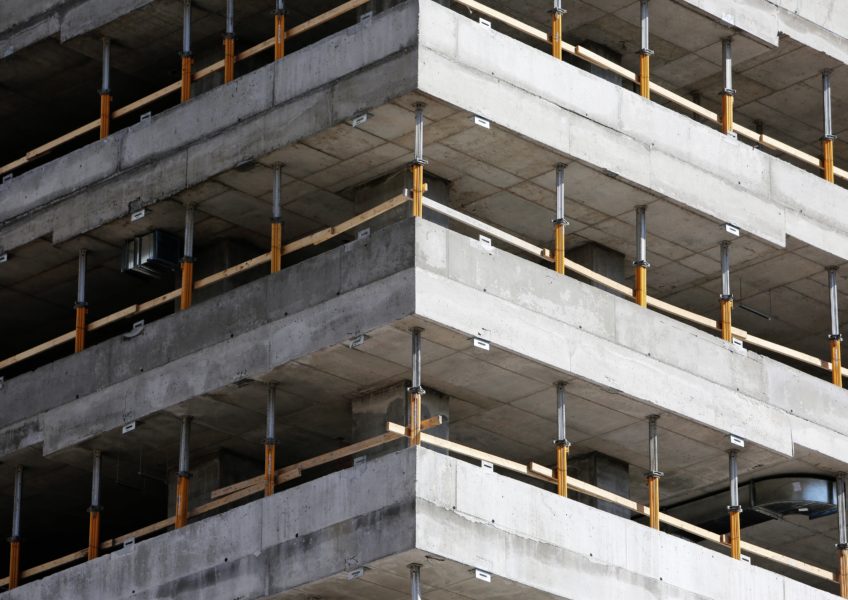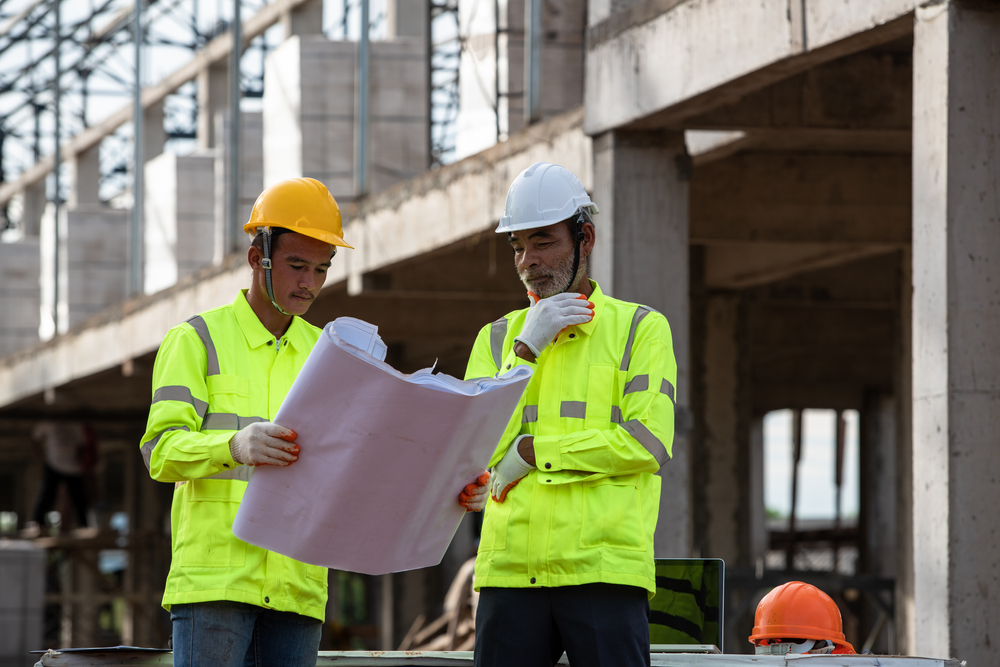Is West Coast General Engineering industrial concrete Right for Your Plant?
Is West Coast General Engineering industrial concrete Right for Your Plant?
Blog Article
The Necessary Function of Concrete Structure in Structural Integrity and Long Life
When it concerns developing a residential property, the foundation is much more critical than you may think. Concrete structures supply unparalleled stamina and longevity, guaranteeing your framework can withstand numerous ecological obstacles. Without a strong base, you risk possible problems like shifting or breaking, which can compromise security and worth. Understanding the subtleties of concrete foundations might be the trick to protecting your investment for many years to come. So, what should you think about next?
Understanding the Importance of Concrete Foundations
Concrete structures are important to the overall security of any type of structure, as they provide the vital support needed to withstand numerous lots and environmental problems. When you think of developing a home or an industrial area, the foundation is the first point you should think about. It acts as a barrier versus dampness, securing your property from water damage. A well-placed concrete structure also prevents settling and moving, which can result in fractures in walls and floorings. You'll intend to assure that the foundation is effectively developed and strengthened, as this impacts the durability of your building. Furthermore, a strong structure can improve power performance by lowering air leakages. Keep in mind, neglecting the relevance of a concrete structure can lead to pricey repairs down the line. Spending in a top quality structure upfront is crucial for the honesty and longevity of your structure.
Advantages of Concrete Foundations for Architectural Honesty
While many factors contribute to a building's structural stability, concrete foundations offer unrivaled sturdiness and strength. You'll value that concrete can withstand extreme climate conditions, withstanding both wetness and temperature level fluctuations. This strength indicates your structure is less likely to experience breaking or moving gradually, which can jeopardize its safety.Additionally, concrete's integral weight supplies a solid base, protecting against movement throughout natural events like earthquakes or floods. When you select a concrete structure, you're also choosing reduced upkeep; unlike wood, it won't rot or bring in pests, conserving you time and money in repairs.Moreover, concrete's fire resistance supplies included safety, ensuring your structure can withstand high temperature levels without significant damages. Overall, spending in a concrete structure indicates you're focusing on the long-lasting stability and integrity of your building, making it a wise option for any building task.
Common Kinds of Concrete Foundations
When it pertains to developing structures, recognizing the typical sorts of concrete foundations can help you make informed options for your project. One of the most prevalent kinds consist of slab-on-grade, crawl space, and complete cellar foundations.A slab-on-grade foundation is an easy, cost-effective option, where a thick concrete piece is put straight on the ground. This type works well in cozy environments, as it lessens warm loss.Crawl area structures raise the home slightly above ground, allowing for ventilation and accessibility to pipes and electric systems. This layout can assist avoid wetness issues.Full basement structures use additional living or storage space while supplying exceptional architectural assistance. They require even more excavation and are typically used in cooler climates to avoid frost heave.
Aspects to Take Into Consideration When Designing a Concrete Structure

Ideal Practices for Putting Up Concrete Foundations
When you're setting up a concrete structure, correct website prep work is vital to assure stability (West Coast General Engineering commercial concrete). You'll additionally need to recognize reinforcement strategies to improve strength and resilience. Finally, do not overlook the curing process, as it plays an essential duty in achieving a strong structure
Website Prep Work Value
It might appear straightforward, appropriate website preparation is crucial for ensuring a solid and sturdy concrete structure. Begin by clearing the location of any kind of debris, plants, or natural product that might compromise the structure's stability. Next, examine the soil kind and compaction; you may need to excavate or include products to develop a stable base. Degree the ground to ensure also weight distribution and stay clear of working out problems later. Mounting appropriate drainage systems is likewise necessary to prevent water build-up, which can damage the structure gradually. Mark out the foundation's measurements precisely to lead the putting process. By complying with these steps, you'll set the phase for an effective concrete structure that stands the examination of time.
Support Strategies Clarified
As soon as the website is effectively prepared, the following action in ensuring a sturdy concrete foundation involves implementing efficient reinforcement techniques. You need to start by making use of steel rebar, which supplies tensile strength and aids prevent breaking. Lay the rebar in a grid pattern, making sure it rises utilizing spacers to preserve correct coverage. In addition, take into consideration making use of wire mesh for additional support, particularly in locations based on hefty loads. Don't neglect to link the rebar crossways firmly with wire. For bigger foundations, fiber reinforcement can improve longevity, reducing the risk of get redirected here shrinking splits. Constantly follow local building regulations and standards to guarantee conformity. By using these reinforcement methods, you'll greatly enhance your foundation's toughness and durability, laying a strong foundation for your structure.
Healing Refine Fundamentals
To guarantee your concrete structure treatments correctly, it is necessary to maintain ample dampness and temperature level conditions right away after putting. Begin by covering the surface with a wet burlap or plastic bed linen to keep moisture. This maintains the concrete hydrated, preventing fractures and making certain strength. You must additionally monitor the temperature level; suitable treating conditions are between 50 ° F and 90 ° F. If it's also hot, haze the surface routinely to stop quick dissipation. For winter, take into consideration utilizing insulating blankets to maintain warmth. Aim for a curing duration of at least seven days, as this is essential for optimum stamina advancement. By adhering to these best techniques, you'll improve your structure's longevity and long life, making certain structural integrity for years to find.
Upkeep of Concrete Structures for Durability
To maintain your concrete structure strong and long lasting, normal examinations are essential. You need to additionally guarantee efficient water drainage services remain in location to avoid water damage. If you detect any cracks, resolving them promptly will save you from bigger problems down the line.

Routine Inspections and Analyses
While regular examinations and evaluations may seem like a job, they're important for maintaining the integrity of your concrete foundation. More Bonuses By regularly looking for cracks, shifts, or signs of wear, you can catch possible concerns prior to they intensify right into expensive fixings. Look for any type of water pooling around the foundation or unusual settling, as these can signify underlying problems. It's likewise smart to keep track of any adjustments in your home's framework, like doors that stick or windows that don't open efficiently. Maintaining a record of your evaluations aids track changes over time, enabling for aggressive maintenance. Inevitably, these evaluations assure your foundation remains secure, sustaining the longevity and safety and security of your entire framework. Don't overlook this important aspect of homeownership!
Reliable Drainage Solutions
Normal evaluations can reveal concerns like drainage issues that could compromise your concrete foundation's security. To stop water buildup, ensure your rain gutters and downspouts direct water away from the foundation. Installing French drains can efficiently redirect surface and groundwater, reducing stress on your structure walls. Furthermore, grading the soil around your home assists ensure that water streams away, instead than pooling near your foundation.Consider making use of sump pumps in locations vulnerable to flooding, as they proactively eliminate excess water. Frequently inspect for blockages in water drainage systems and clear them immediately. You'll secure your structure's integrity and longevity by taking these proactive measures. Keep in mind, efficient drain remedies are necessary for maintaining a solid, sturdy concrete foundation.
Prompt Fracture Fixes
When you notice cracks in your concrete foundation, addressing them promptly is essential for maintaining its longevity. Small cracks can promptly progress right into bigger problems, jeopardizing the structural stability of your home. Regularly examine your structure for signs of damage, such as straight or vertical cracks. If you spot any, don't wait-- repair them immediately. You can make use of epoxy shots or concrete patching substances, which are effective for sealing splits. Always comply with the maker's guidelines and consider consulting a professional for considerable damage. Remember, timely fixings not only improve your structure's sturdiness but also save you cash in the future by preventing a lot more considerable repairs down the line. Remain positive, and your structure will certainly continue to be solid and safe and secure.
Attending To Usual Issues With Concrete Foundations
Concrete foundations can deal with numerous concerns over time, making it critical to identify and resolve them immediately. One of the most usual troubles is cracking, which can take place because of temperature level fluctuations or resolving dirt. If you observe cracks, it's vital to analyze their size and deepness; small fractures can typically be secured, while bigger ones might call for professional evaluation.Water intrusion is one more significant concern. Excess dampness can result in mold development and structural deterioration. Assurance proper water drainage around your structure to mitigate this threat. Additionally, search for signs of moving or bowing walls, as this can indicate underlying problems with your structure's stability.Regular inspections additional hints are essential to catch these issues early. If you identify any concerning signs, don't be reluctant to speak with a foundation expert. By remaining proactive, you can preserve the stability and long life of your concrete structure, ensuring your home continues to be secure and safe.
Often Asked Concerns
Just How Does Soil Type Affect Concrete Foundation Efficiency?
Dirt type considerably affects concrete foundation efficiency. If you've got extensive clay, for circumstances, it can trigger shifting and splitting. Sandy dirt could lead to working out. Comprehending your dirt assists ensure a steady structure.
Can Concrete Foundations Be Repaired if Harmed?
Yes, you can fix broken concrete foundations. Depending on the degree of the damages, techniques like epoxy injection or slab jacking can recover security. It's best to consult a professional for reliable options.
What Is the Regular Lifespan of a Concrete Structure?
A concrete foundation commonly lasts 30 to 100 years, depending on elements like soil problems, environment, and maintenance. You'll wish to watch on it to assure it stays healthy throughout its lifespan.
Are There Option Materials to Concrete for Foundations?
Yes, there are options to concrete for foundations, like steel, lumber, or perhaps recycled products. Each choice has one-of-a-kind benefits and drawbacks, so you should consider your job's details requirements when selecting the best product.
Just How Does Climate Influence Concrete Structure Toughness?
Climate greatly influences concrete foundation resilience (WCGE commercial concrete). Extreme temperatures, dampness, and freeze-thaw cycles can deteriorate the material, leading to fractures and architectural problems. You need to consider neighborhood climate problems when planning your structure to ensure lasting efficiency
Report this page